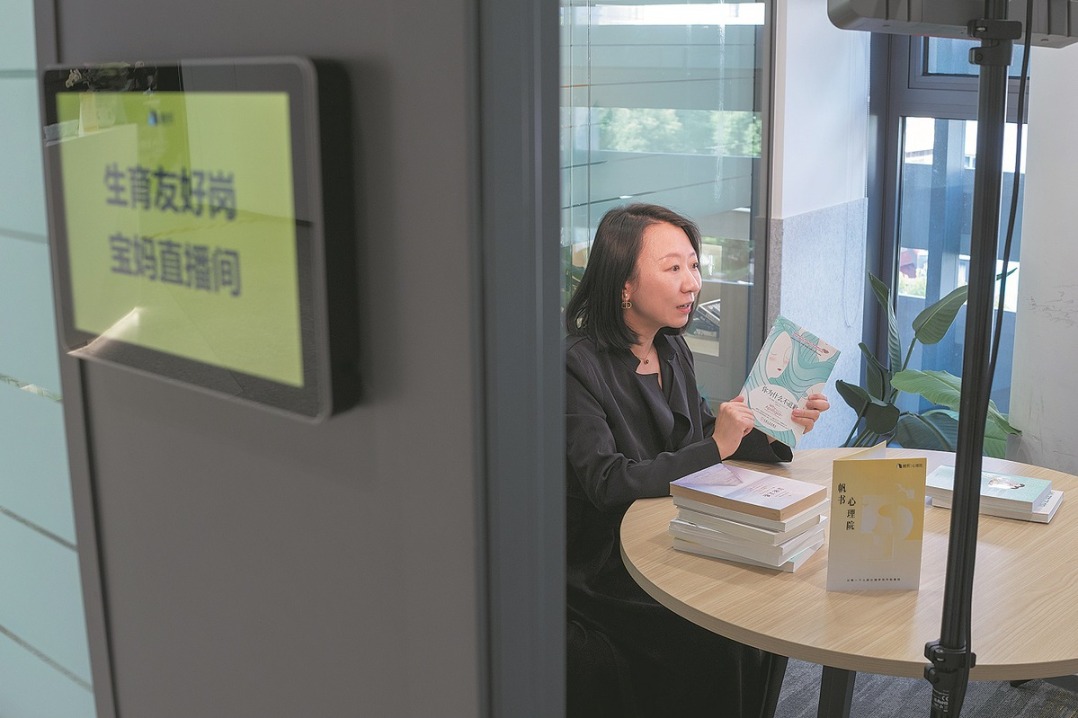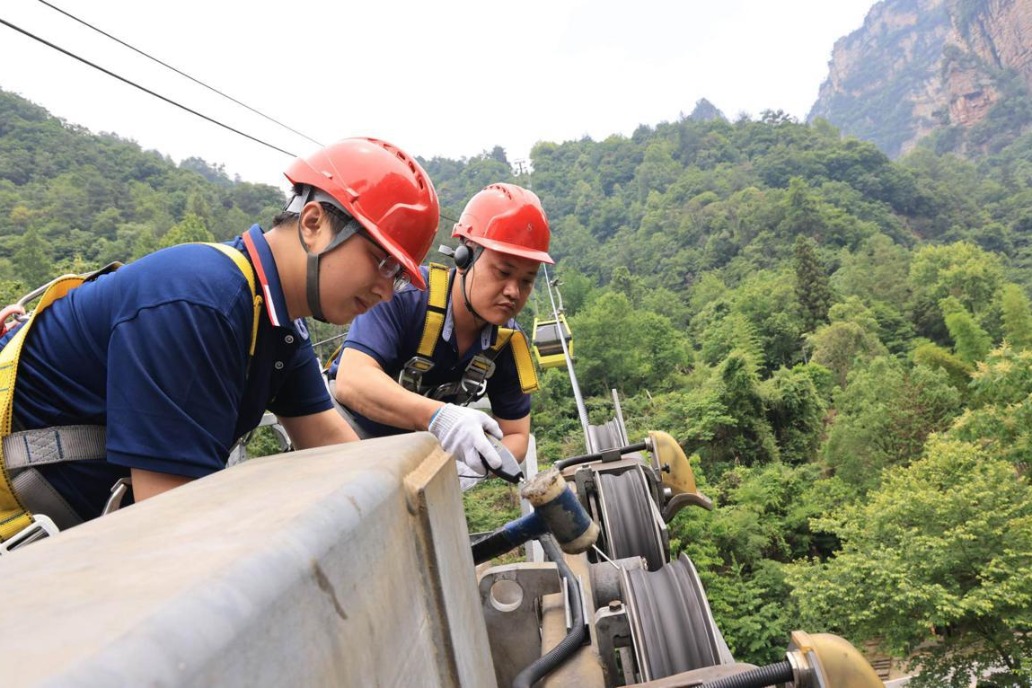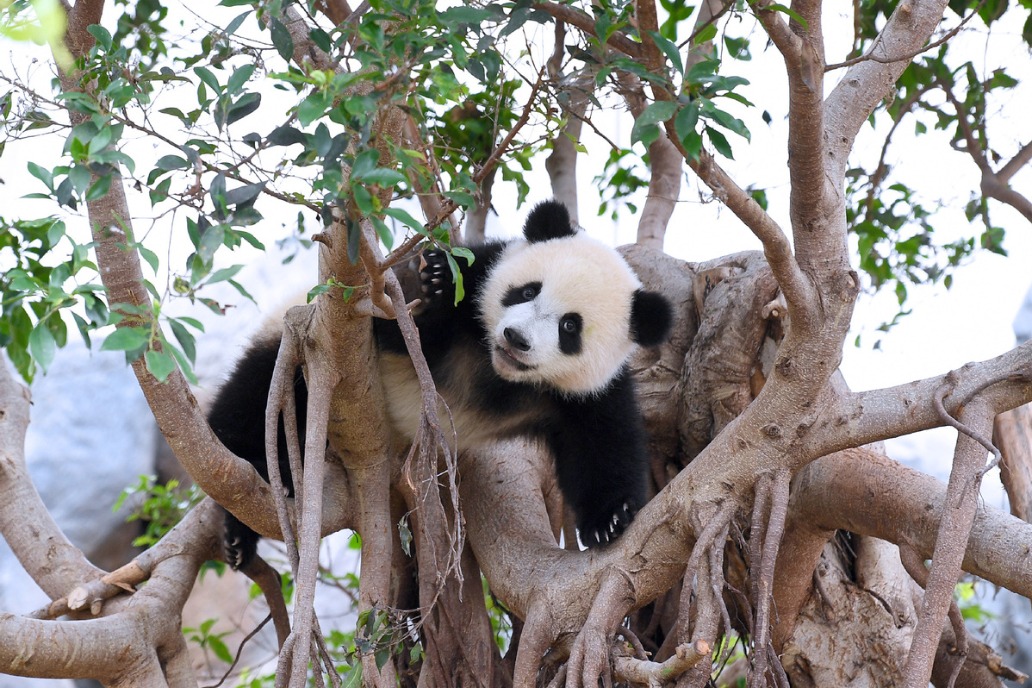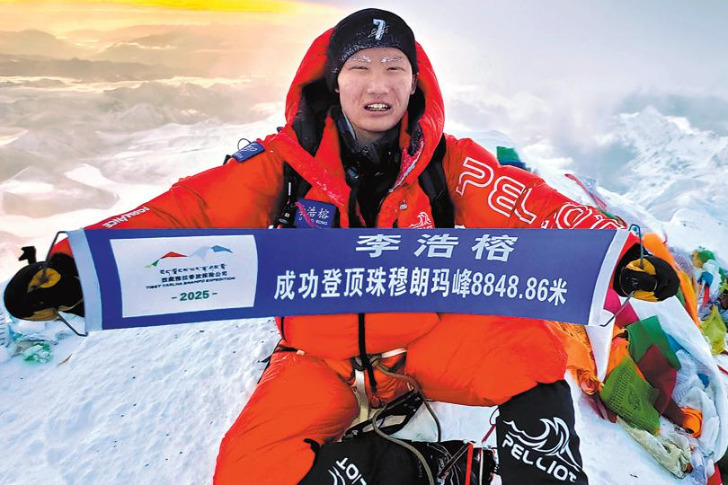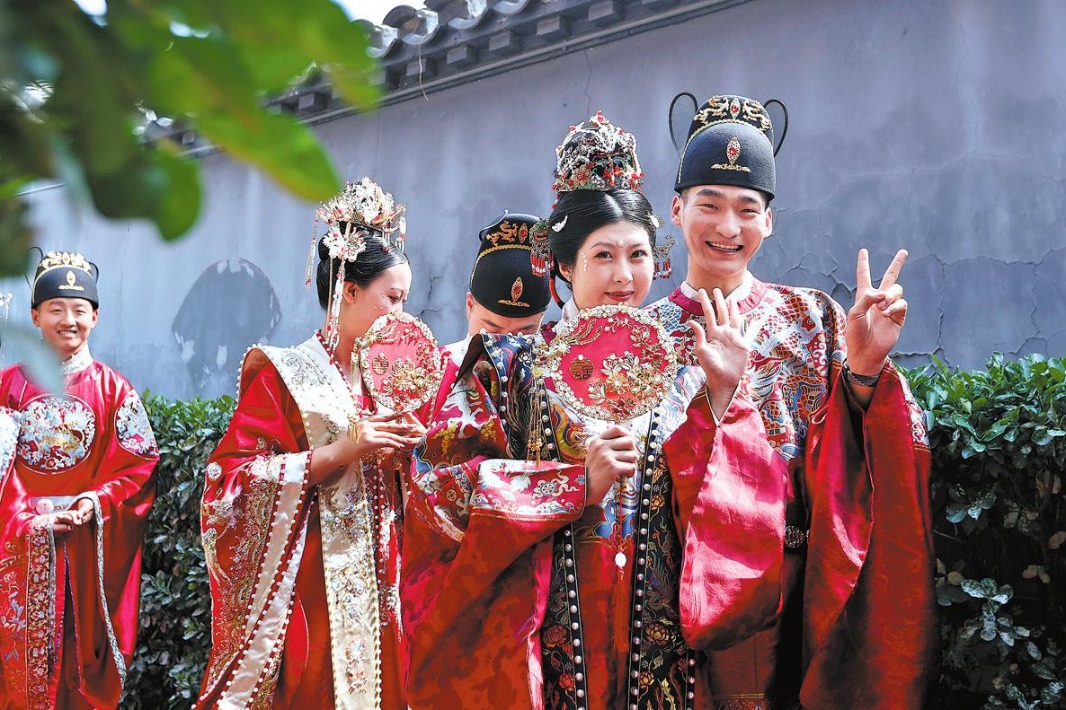Talks seen as key amid tariffs
Ex-diplomat urges China-US dialogue as uncertainty weighs on Iowa farmers

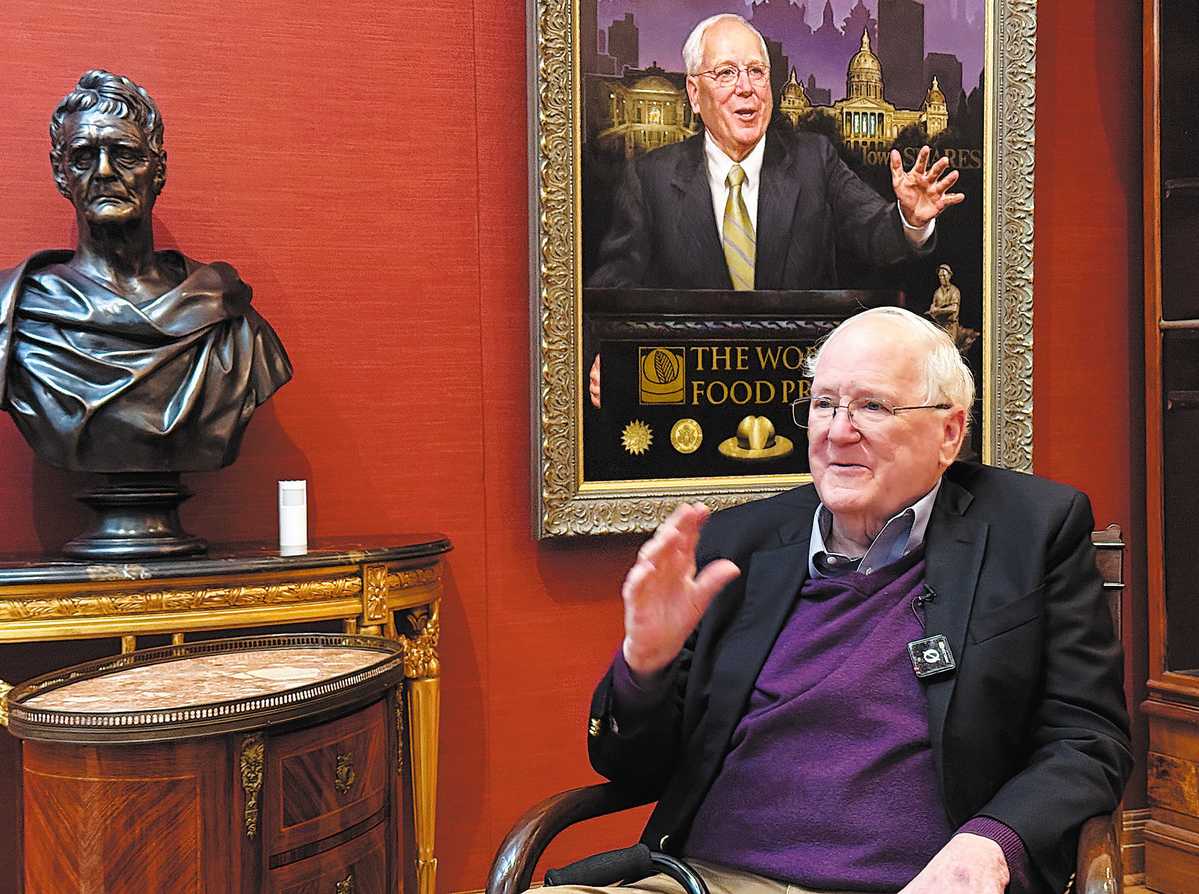
Golden sunlight shimmers on the Mississippi River as visitors glide past Iowa's peaceful shores — along the same waters that carry the state's crops to markets around the world.
Travel and trade between China and Iowa have flourished for decades.
"When President Xi gave his toast, and he talked about being in Muscatine, he quoted Mark Twain talking about the sun over the Mississippi River," Kenneth Quinn, former president of the World Food Prize Foundation and a former 32-year career US Foreign Service officer, told China Daily.
"Oh, it was so incredibly touching. And I had never heard a foreign leader talk about my country that way," he said.
Quinn recalled then vice-president Xi Jinping's 2012 visit to Iowa, which was his second trip to the state.
In 1985, Xi, then an official of Zhengding county, Hebei province, led a five-member delegation to Iowa, known as "the world's food capital", to learn about crop production and livestock farming.
During the trip, Xi met with ordinary US people, toured local farms and built friendships that have lasted for decades.
"You were the first group of Americans I came into contact with," Xi told his Iowa friends in 2012. "To me, you are America."
As the then-president of the World Food Prize Foundation, which hosted the US-China agricultural symposium, Quinn met with Xi during his 2012 visit to Iowa and described it as a "homecoming" visit.
With a hand over his heart, he spoke with warmth and quiet joy. Quinn said he remembered the moment clearly and had shared the story with both Chinese and US media many times.
As he told it again, he smiled, pointing to the spot where Xi and he met, where they shook hands and recalled their conversation.
Quinn recalled that year as not only a time when soybean contracts were signed and deeper agricultural cooperation between the two countries began, but also as a moment when old friendships were rekindled and new bonds were formed between individuals.
The foundation also has marked other key moments in the US-China exchange at the institutional level, including the recognition of two prominent Chinese laureates: Yuan Longping, known as the "Father of Hybrid Rice", and He Kang, a distinguished Chinese agronomist.
At the state-province level, Iowa also shares a special, four-decade sister-state relationship with China's Hebei province.
Iowa, the agricultural heartland of the US, exports soybeans, corn and pork along the Mississippi River to markets around the world, with China as one of its largest overseas buyers.
The US is a major soybean producer, but nearly half of its output depends on exports, after covering domestic consumption.
For China, the growing demand driven by emerging industries has made soybeans an essential import, and the US and China maintained a complementary soybean trade, with the US supplying large quantities to meet China's needs.
New challenges
However, the once-stable trade relationship faced new challenges as tensions rose in 2018, when the US initiated a trade war with China, leading to changes in international commodity trade.
In 2024, data from the US Department of Agriculture showed that 40 percent of Iowa's soybean production was exported, with China accounting for 40 percent of the exports. Meanwhile, the US share of China's total soybean imports fell from 40 percent in 2016 to 22.8 percent in 2024.
Tariffs have created uncertainty for Iowa farmers.
For now, the trade war between China and the US has de-escalated following an agreement reached at the trade meeting in Geneva on May 12, with both countries agreeing to lower "reciprocal tariffs".
"There's negotiation. I believe they'll come to some agreement and benefit local farmers," said Quinn, who has been living in Iowa for decades.
"I'm very encouraging of trade. I believe that trade is one of those exchanges that build into relationships a basis for remaining at peace," Quinn said. "Some people speak about the decoupling of the US and China. I believe that we shouldn't be decoupling at all, that we should be exploring more and more business opportunities."
Quinn said that as two countries are negotiating a trade deal, they are also "recoupling".
He said he hopes that nonprofit organizations like the World Food Prize can continue to serve as platforms to advance ideas in ways that are effective and meaningful for both countries and foster more dialogue, deals and connections from high-level engagement to people-to-people exchanges.
"Alleviating hunger can bring people together across even the broadest differences," Quinn said, emphasizing that agriculture, one of the key sectors of Iowa, offers a unique pathway for collaboration between China and the US for the same goal of human welfare in developing countries and the world.
He said the two nations should commit to working together — not just on food security, but as a way to shift away from a dangerous trajectory of rivalry.
"The path of China and the United States as adversaries can only lead to extremely damaging outcomes," he said.
"I believe the peace through agriculture, discussing the agricultural issue, and a collaboration between China and the US is the best hope of turning away that trajectory," Quinn said, adding that on many of the world's biggest challenges, progress is only possible when the US and China work together.
Quinn, 83, a former US ambassador to Cambodia, said his dedication to US-China relations stemmed not only from his career in Asia but also from his early trip to China as a young man.
He first visited China in 1979, accompanying then Iowa governor Robert D. Ray at the very beginning of normalizing relations.
"I was, at first, curious about China," Quinn said. "In 1979 … I had the opportunity for several days to go off by myself. I looked around."
First trip
During that trip, he explored China on his own — getting lost at the airport in Shanghai, hopping on a bus straight to his hotel, venturing through Guangdong province and visiting Guilin, where he rode a boat on the Lijiang River.
"I row down the Lijiang River. It was magical. So it was a sense of dynamism and unknown," Quinn said. "I couldn't speak any Chinese.
"There were no tall buildings. Everybody was dressed in mild jackets. There were a few cars; you could walk across the street without looking and not worry that you'd be hit by a car. You might get hit by a bicycle," he recalled of his first impressions of China.
Quinn's many visits to China gave him a front-row seat to the country's transformation, which also deepened his understanding of the need for dialogue.
Quinn said he felt special to witness China's development during his approximately 20 trips to the country since 1979. The friendship, he added, has endured for years — not just through official delegations but through genuine, lasting connections with the Chinese people.
Beyond economics, Quinn observed that cultural differences played a role in misunderstandings between the two nations.
Drawing from his experience as an ambassador and his understanding of tariffs, Quinn observed that cultural practices played a role in the tariff escalations in early April.
He said he was so glad to see that the two countries could reach a deal quickly.
Quinn said he believed those misunderstandings between China and the US could be resolved through more dialogue.
Many challenges could be addressed through communication, benefiting not only Iowa farmers with their 40-year friendship with China but also more businesses and people on both sides, he added.
"I have to keep trying and doing my best with my experience and even some small way calling attention to these issues, and hopefully, hopefully, getting the US and China together," he said.
mingmeili@chinadailyusa.com
- Chinese vice-premier calls for sound development of platform economy
- Incentive offer to find endangered turtle raises concern
- Senior military official calls for high-level training support system
- Chinese vice-premier urges greater efforts to combat desertification
- Innovative vessel in Guangdong signals new era sea farming
- Marriage and having kids losing appeal

















